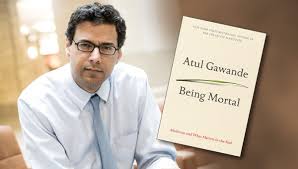
If this is the first article that you've come across the Ankota's series on Atul Gawande's book Being Mortal, you might want to start from the beginning. Here's a link to Chapter 1.
This book has definitely taken me on a journey with ups and downs. Chapter 5 was a real high point where we learned about an individual who redefined the nursing home experience in an inspirational way. I assumed, somewhat correctly, that it would be downhill from there as the book moves specifically in the direction of people actually dying.
Chapter 6 talked about the difference between a medically perpetuated end-of-life versus the more "managed" end-of-life experience that you can experience through hospice and palliative care. The stories of medically perpetuated lives were somewhat grim but then there was an upturn as we learned more about hospice. Chapter 7 talks a lot more about hospice but looks at it from a different angle.
Hard Conversations - Coming to Grips with End of Life and Controlling Your Destiny
This chapter is very personal to the author as his father, also a physician, is confronting declining health. What starts as a progressive neck pain is eventually diagnosed as a tumor in the spinal column. Being a doctor (both well-connected and wealthy), Dr. Gawande senior goes for multiple diagnoses, one in Boston and one at the Cleveland Clinic, and Dr. Gawande, the author, talks about two classical approaches to how the doctor communicates. One of the doctors is all about a message of "the best way we can fix this is as follows" whereas the other takes the approach of sharing knowledge and not trying to impose a specific recommendation.
Then the author reminds us that medical training and hospitals are all about "fixing" the problem but as we learned in chapter 6 they're often recommending how you can trade quality of life "now" with the possibility of better quality of life later; but it doesn't always work out that way as we've seen numerous times in the book and likely also from our personal experiences. But on the other hand, just providing facts breaks down when the decision isn't an easy one. He goes on to talk about a "third way."
Dr. Gawande learns to approach medicine differently. When he sees a situation where his medical experience leads him to believe that extreme measures like surgery, chemo, and radiation aren't going to make things better, he learns to say "I'm concerned" and open the door for a hard but real conversation. In chapter 7 his new phrase is "What is most important to you?"
The main story in the chapter is that of his father's decline and the decisions made about what to try and what not to try. After several first moves with varying measures of success, there's an offer for hospice. The patient's wife doesn't want to hear about it because she feels like it's "giving up." The patient however wants it and it leads to a very positive situation. From a medical perspective, the concept is essentially "palliative medicine" (meaning making the medical decision that maximizes quality of life as defined by the patient).
What Can Home Care Leaders Learn From This?
For me, the big takeaway is that when patients get to the point where there's no "recovery" there are still choices that can be made that lead to a better life. We in home care get patients a lot earlier that that, so there's an even bigger potential upside to asking them what's most important to them.
What do you think?
Please feel free to post your comments below, or better yet, on our online book club page on Goodreads.com.If you haven't already, please join the conversation by clicking the button below or sharing your thoughts in the comments below!


 Spotify
Spotify  Pandora
Pandora  YouTube
YouTube 


Your Comments :